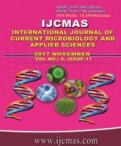


 National Academy of Agricultural Sciences (NAAS)
National Academy of Agricultural Sciences (NAAS)

|
PRINT ISSN : 2319-7692
Online ISSN : 2319-7706 Issues : 12 per year Publisher : Excellent Publishers Email : editorijcmas@gmail.com / submit@ijcmas.com Editor-in-chief: Dr.M.Prakash Index Copernicus ICV 2018: 95.39 NAAS RATING 2020: 5.38 |
The continuous increasing population in India leads huge pressure on agricultural lands along with other natural resources to produce more foods. Increasing use of chemical fertilizers in agriculture could make the country self-dependent in food production but on the contrary it deteriorates the environment and causes harmful impacts on living beings. During green revolution remarkable food production was noticed in which concern for sustainability was overlooked. Dependence on chemical fertilizers for future agricultural growth would mean further losses in soil quality and possibilities of water contamination. The term biofertilizer refers to formulation containing live microbes which helps in enhancing the soil fertility by fixing atmospheric nitrogen, solubilization of phosphorus and other nutrients and augmenting plant growth by producing growth hormones. Since the concept is not a new, multifarious advantages of biofertilizer leads to its wide applicability in sustainable agriculture. In spite of being cost effective and eco-friendly in nature, several constraints include unreliable supplies and absence of proper quality control limit the application or implementation of the technology. Extensive research is required to identify more suitable strains, develop better production technologies and quality control measures for wide commercialization of biofertilizer. The development of biofertilizer with multi-crop growth promoting activities is most important for sustainable global agriculture.
 |
 |
 |
 |
 |